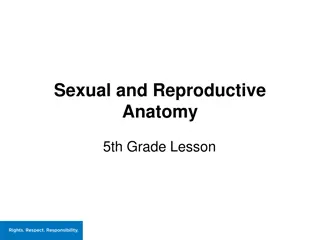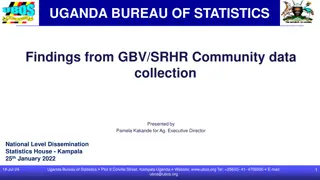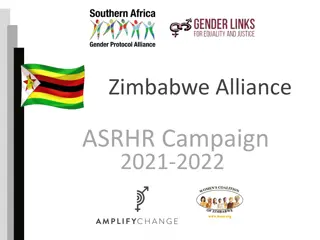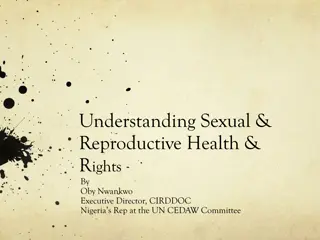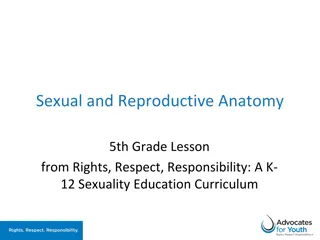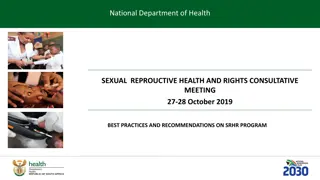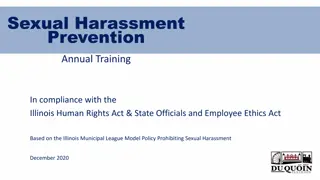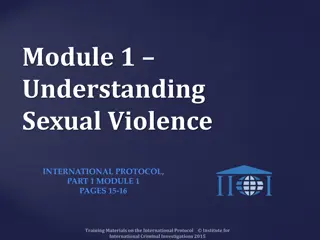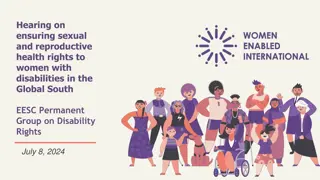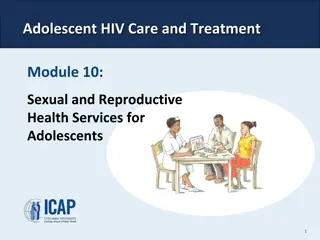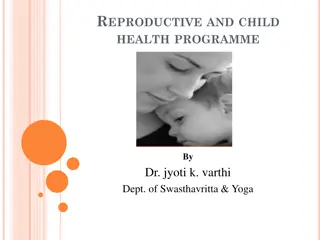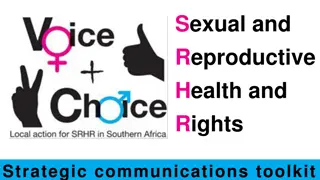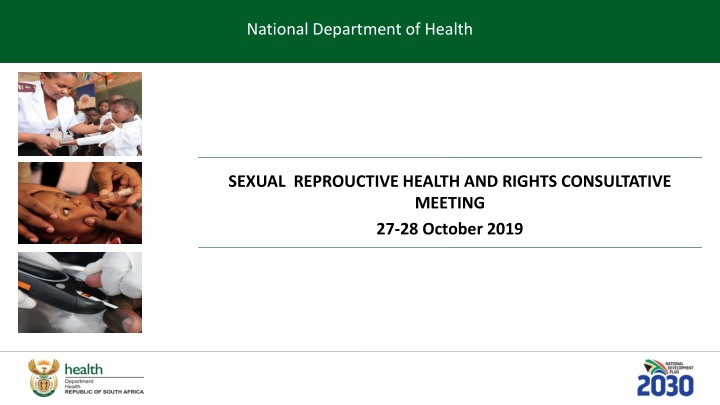
National Department of Health Sexual Reproductive Health and Rights Consultative Meeting
This detailed report covers the implementation and outcomes of various projects focusing on sexual and reproductive health, HIV prevention, and gender-based violence services in the eThekwini District. Key lessons learned and best practices are highlighted, showcasing successful strategies to improve health outcomes for adolescents and young women.
Download Presentation

Please find below an Image/Link to download the presentation.
The content on the website is provided AS IS for your information and personal use only. It may not be sold, licensed, or shared on other websites without obtaining consent from the author. If you encounter any issues during the download, it is possible that the publisher has removed the file from their server.
You are allowed to download the files provided on this website for personal or commercial use, subject to the condition that they are used lawfully. All files are the property of their respective owners.
The content on the website is provided AS IS for your information and personal use only. It may not be sold, licensed, or shared on other websites without obtaining consent from the author.
E N D
Presentation Transcript
National Department of Health SEXUAL REPROUCTIVE HEALTH AND RIGHTS CONSULTATIVE MEETING 27-28 October 2019
Prevention and treatment of HIV and other sexually transmitted infections Prevention and treatment of HIV and other sexually transmitted infections Name of Project Name of Project Province/Districts Province/Districts covered covered Duration Duration Integrated PrEP and SRH services for AGYW eThekwini District July 2018 current Lessons Learnt: Lessons Learnt: o Stakeholder relationships are important Greater buy-in from health facilities when initiatives are led by the DoH instead of IPs o Onsite training and mentoring yields better outcomes as compared to offsite, once-off training o Demand creation activities for PrEP are important to increase uptake of services: Buy-in from SRCs at TVETs to support mobilization Use of various platforms to promote PrEP i.e. radio stations, community dialogues, etc. o Inclusion of psychosocial support services for AGYW are integral to the uptake & adherence of PrEP as this creates an holistic approach to patient care Best Practice: Best Practice: Implemented an integrated SRH and HIV Prevention package of services (inclusive of PrEP) for HIV- negative at risk AGYW, in five health facilities, 11x TVETs and one university in eThekwini District. Services provided included: HIV Testing Services, sexual behavioural risk screening & risk-reduction counselling, screening for GBV including the provision of PEP, TB screening, STI screening and management, provision of condoms and contraceptives, provision of PrEP for HIV negative clients and provision of ART for HIV positive clients Placed youth connectors, NIMART-trained nurses and HTS counsellors at all PrEP sites Developed a sexual behavioural risk tool and placed it at KEPs within health facilities. Trained HTS counsellors on use of tool Created demand for PrEP by conducting dialogues on community radio stations, educating SRCs at TVETs, high school principals and OVC prevention partners on PrEP. Distributed PrEP IEC material to health facilities, TVETs and universities Results Achieved Results Achieved 6,032 Number of AGYW tested for HIV 6,102 Number of AGYW testing HIV negative Number of AGYW accepting PrEP offer and initiated onto PrEP Number of AGYW screened for pregnancy Number of AGYW screened positive for pregnancy Number of AGYW screened for new STI Number of AGYW screened positive for a new STI & received treatment 71 Number of AGYW that received contraceptives Number of AGYW that received condoms 1,420 Number of AGYW testing HIV positive 70 3,724 6,102 6,059 Number of AGYW testing HIV positive that were initiated onto ART 68 (97%) 5,024 352 2
Prevention, detection, immediate services and referrals for cases of sexual and gender Prevention, detection, immediate services and referrals for cases of sexual and gender- -based violence violence based Name of Project Name of Project Province/Districts Province/Districts covered covered Duration Duration Implementation of post-violence care services in CHCs and PHCs eThekwini District October 2018 current Lessons Learnt: Lessons Learnt: Mapping services and community providers within the catchment areas of post-violence care implementing health facilities strengthens bi-directional referrals pathways and stakeholder collaborations Implementation of GBV screening tool at KEPs within health facilities supports greater detection of survivors of GBV and sexual assault Onsite training of healthcare workers on GBV and PVC services is essential Continuous community dialogues on GBV and gender equality is essential in decreasing GBV prevalence and discrimination Best Practice: Best Practice: Implemented post-violence care services in 15x health facilities in eThekwini District, where the minimum package of PVC services included: (a) HTS, (b) STI screening and prophylaxis, (c) Emergency Contraception, (d) Post-Exposure Prophylaxis and (e) First Response Counselling and (f) referrals for medico-legal examinations and ongoing community-based psychosocial counselling Placed 15x GBV linkage officers at each PVC site to create demand for PVC services and support identification and linkage to care of GBV and sexual assault survivors Developed a GBV screening tool, GBV register and PEP completion tracking tool and placed it at all key entry points within health facilities. 397x facility staff received onsite training and mentoring in GBV screening & the provision of PVC services Strengthened bi-directional referral pathways between PVC implementing sites and community service providers Results Achieved: Results Achieved: 2, 693 GBV clients across all age groups were identified using the GBV screening tool; of which 1, 464 were survivors of sexual assault Of 1, 464 sexual assault patients, 909 were females aged 10-24yrs 768 sexual assault cases were initiated onto PEP, with 100% completion rate 3
Recommendations Recommendations SRHR SRHR Improve and move beyond syndromic STI management Implement Point-Of-Care Diagnostic Testing (GeneXpert) for sexually transmitted infections (STIs), specifically Gonorrhoea and Chlamydia Strengthen STI screening of patients at all key entry points within health facilities Implement psychosocial support for addressing disclosure of STIs for individuals in violent relationships HIV Prevention HIV Prevention Scale-up the roll-out of Pre-Exposure prophylaxis to all Community Health Centres and Primary Health Care facilities especially at family planning sites Fast-track the inclusion of the PrEP module onto Tier.net Include adherence support for AGYW on PrEP through Peer Support Model Strengthen PrEP communication messaging to improve uptake of services Continuous training of healthcare workers on STIs and PrEP Incorporate interactive online health education sessions for AGYW utilising the B-wise app 4

